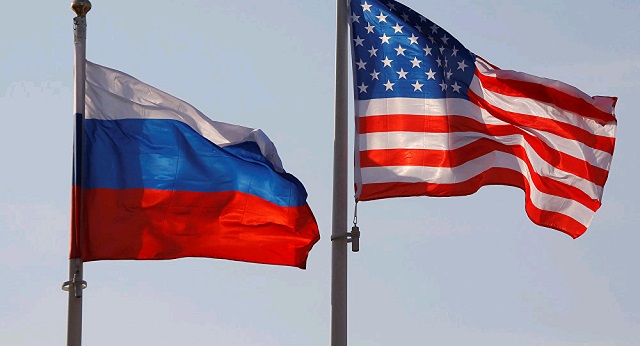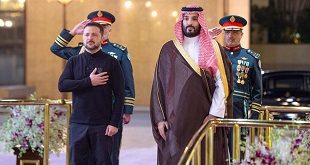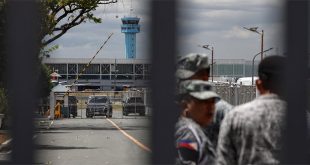
The United States has for weeks raised the prospect of more sanctions against Russia, lead by President Vladimir Putin, for alleged election meddling and the hacking of federal agencies
Washington, U.S. | Xinhua | The United States has imposed sanctions on Russia and expelled 10 diplomats, while Russia vowed to respond with retaliatory measures.
The sanctions, in response to Moscow’s alleged election interference and cyber activities, were announced on Thursday, just two days after U.S. President Joe Biden proposed a summit meeting with his Russia counterpart, Vladimir Putin, during their phone conversation on Tuesday.
TOUGH MEASURES
The White House said in a statement that President Biden had signed a new sanctions executive order against Russia.
According to the order, the U.S. Department of the Treasury issued a directive that prohibits U.S. financial institutions from participating in the primary market for ruble or non-ruble denominated bonds issued after June 14, 2021, by Russia’s central bank, the national wealth fund, or the finance ministry.
The Treasury also designated six Russian technology companies that “provide support to the Russian Intelligence Services’ cyber program,” and 32 entities and individuals related to the 2020 U.S. presidential election interference, the statement said.
In addition, the Treasury, in partnership with the European Union, the United Kingdom, Australia and Canada, sanctioned eight individuals and entities over the Crimea issue.
The United States is expelling 10 personnel from the Russian diplomatic mission in Washington D.C., the statement added, saying the personnel “include representatives of Russian intelligence services.”
The statement also accused the Russian Foreign Intelligence Service of carrying out the alleged SolarWinds hack last year.
The Kremlin repeatedly said that claims of Russia’s alleged meddling in the 2020 U.S. elections were baseless and regretful, calling them a pretext for additional sanctions.
On the same day, Russia Deputy Foreign Minister Sergei Ryabkov summoned U.S. Ambassador to Russia John Sullivan, telling him that the new anti-Russian sanctions will shortly be followed by “a series of retaliatory measures” in the nearest time.
Ryabkov told Sullivan that these measures are “unacceptable” and have dealt a new heavy blow to the pragmatic relations between the two countries.
Russian Foreign Ministry spokesperson Maria Zakharova told a press conference Thursday that Washington must realize that it will “pay a price” for the degradation of U.S.-Russian relations.
SOFT TONES
Even so, Biden called for de-escalating the tension with Moscow after authorizing the sanctions.
During his remarks on Russia on Thursday evening, Biden detailed his phone call with Putin, as well as his administration’s approach to bilateral relations.
“I was clear with President Putin that we could have gone further, but I chose not to do so. I chose to be proportionate,” Biden said, referring to the punitive actions.
“The United States is not looking to kick off a cycle of escalation and conflict with Russia,” Biden said. “We want a stable, predictable relationship.”
Biden suggested that Washington and Moscow work together to address global challenges such as non-proliferation, global pandemic, and climate change.
“Now is the time to de-escalate. The way forward is through thoughtful dialogue and diplomatic process,” Biden said. “The U.S. is prepared to continue constructively to move toward that process.”
The White House on Thursday also held a background press call on Russia by senior administration officials via teleconference.
“We do not seek, we do not desire a downward spiral. We think we can and should avoid that,” a senior administration official said.
“But we have also been clear, publicly and privately, that we will defend our national interests and that we will impose costs on Russian government actions that seek to harm our sovereignty,” the official said.
“Unfair Competition”
Russian Foreign Intelligence Service Director Sergei Naryshkin said the sanctions are “an unfriendly and very ill-considered step,” which undermine international stability.
“Competition between the world’s leading intelligence services should be fair. However, the series of sanctions are a sign of unfair competition,” Naryshkin noted.
“The sanctions were rather inconsistent with a friendly phone conversation between Putin and Biden just two days ago,” he added.
In the view of Russian parliament member Sergei Zheleznyak, the U.S. sanctions are a rather “strange move,” which will most likely affect the U.S. banking sector itself more than the Russian economy.
“Through the anti-Russian hysteria in the United States and the fabrication of different pretexts to pressure Russia, the United States is pursuing a policy of Russia containment,” Zheleznyak said. “These actions will negatively affect the development of bilateral dialogue.”
Ivan Timofeyev, programs director at the Russian International Affairs Council, said Washington’s move was intended to show the American public that Biden’s offer to hold an in-person meeting with Putin is not a “concession and that Biden is approaching the summit with Putin from a position of power.”
“The sanctions showed America’s pragmatism. They choose to cooperate on some matters, while they don’t on others,” said Pavel Koshkin, fellow of the Institute of U.S. and Canadian Studies at the Russian Academy of Sciences.
“The sanctions are not only political but also economic in their nature. Similar to the situation with the Nord Stream 2 project, Washington is pursuing its economic interests with the help of sanctions,” Koshkin added.
 The Independent Uganda: You get the Truth we Pay the Price
The Independent Uganda: You get the Truth we Pay the Price


